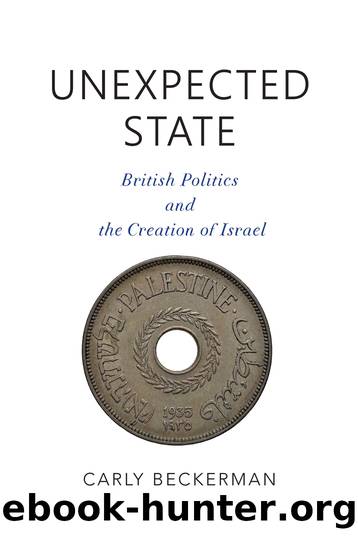Unexpected State by Carly Beckerman

Author:Carly Beckerman
Language: eng
Format: epub, pdf
ISBN: 9780253046444
Publisher: Indiana University Press
Published: 2020-02-21T00:00:00+00:00
4The MacDonald Betrayal, 1936â1939
THE ARAB REVOLT (1936â1939) preceded events that appeared to represent a major shift in British policy toward Palestine. Despite a commitment to the Jewish national home expressed in the Balfour Declaration, the official Mandate, the Churchill White Paper, and the âBlack Letterâ of 1931, the MacDonald White Paper of 1939 seemed to abrogate any further obligation to Zionism. Instead, this new policy committed Britain to an independent Palestine with a permanent Jewish minority. Considering the difficulties faced by previous British governments in attempting to withdraw from the Jewish national home, this new direction was highly controversial. Labeled âbetrayalâ and âappeasement,â the MacDonald White Paper was in many ways a direct result of the violent uprising of the Arab Revolt.1 Demonstrating why, however, is more complicated than a simple analogy with the Munich Agreement.
Unlike the Churchill White Paper and reversal of Passfieldâs white paper, this decision to end the Jewish national home would indeed have seemed rational in terms of Britainâs national interest (i.e., through weighing costs vs. benefits for the state as a whole). Between the beginning of the Arab Revolt and the publication of the MacDonald White Paper, two commissions of inquiry resolutely presented the British government with the same fundamental and irresolvable flaws in the national home policy that had characterized all previous investigations, leading the government first to pursue partition of Palestine and then to decide in favor of a single-state solution. In the context of imminent war in Europe, this decision reflected the adoption of advice from two preeminent committees in order to end rebellion in the empire and refocus attention and resources closer to home. This, however, is an incomplete picture, not least because similar reasoning fails to explain previous British behavior toward Palestine. Looking at the relevant politiciansâ political problems lends an additional insight, a more nuanced understanding that demonstrates specifically which governmental concerns influenced the decision to abandon Zionism and why this sudden shift in policy actually represented far more continuity than change.
During this episode, the decision makersâ key concerns centered around diplomatic needs, bureaucratic politics, and parliamentary politics. The government then chose among the only politically viable alternatives by trying to minimize the burden for Britainâs strategic and economic imperatives. Rather than a sudden U-turn in Palestine policy as the result of appeasement, this chapter reveals a rebalancing of diplomatic interests in the Middle East necessitated by the Italian and German threats and made possible by a large Conservative majority in the House of Commons.
Download
This site does not store any files on its server. We only index and link to content provided by other sites. Please contact the content providers to delete copyright contents if any and email us, we'll remove relevant links or contents immediately.
| Africa | Americas |
| Arctic & Antarctica | Asia |
| Australia & Oceania | Europe |
| Middle East | Russia |
| United States | World |
| Ancient Civilizations | Military |
| Historical Study & Educational Resources |
Machine Learning at Scale with H2O by Gregory Keys | David Whiting(4313)
Never by Ken Follett(3957)
Fairy Tale by Stephen King(3399)
Oathbringer (The Stormlight Archive, Book 3) by Brandon Sanderson(3214)
The Man Who Died Twice by Richard Osman(3079)
Will by Will Smith(2920)
Rationality by Steven Pinker(2364)
Can't Hurt Me: Master Your Mind and Defy the Odds - Clean Edition by David Goggins(2341)
The Dark Hours by Michael Connelly(2308)
Friends, Lovers, and the Big Terrible Thing by Matthew Perry(2230)
The Dawn of Everything: A New History of Humanity by David Graeber & David Wengrow(2209)
Principles for Dealing With the Changing World Order: Why Nations Succeed and Fail by Ray Dalio(2055)
A Short History of War by Jeremy Black(1848)
HBR's 10 Must Reads 2022 by Harvard Business Review(1844)
Go Tell the Bees That I Am Gone by Diana Gabaldon(1758)
A Game of Thrones (The Illustrated Edition) by George R. R. Martin(1745)
Kingdom of Ash by Maas Sarah J(1678)
515945210 by Unknown(1667)
443319537 by Unknown(1559)
